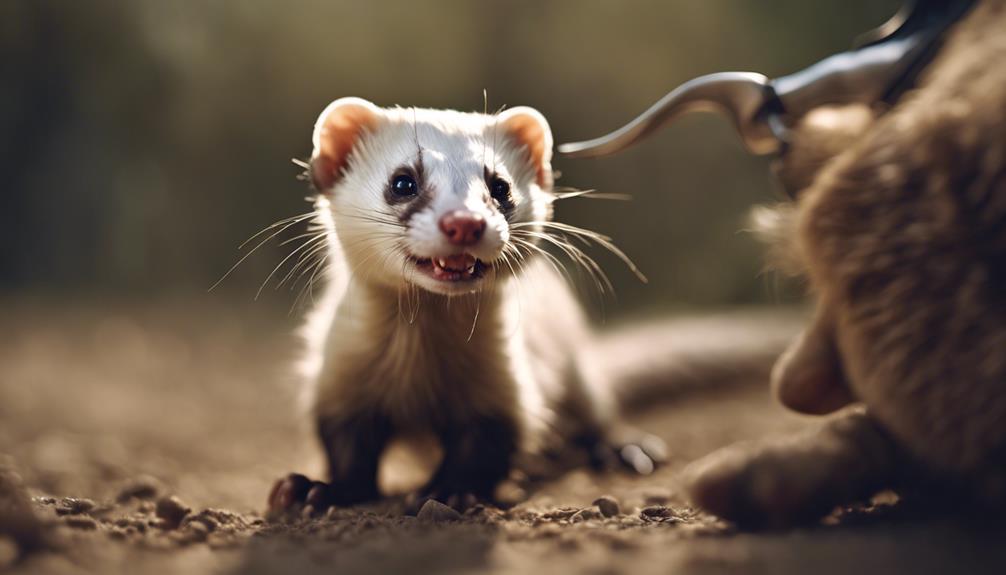What Are the Benefits of Feeding Ferrets Whole Prey?

Whole prey diets provide ferrets with the necessary nutrients they would consume in the wild, promoting a more natural and balanced diet. Ferrets fed whole prey tend to have shinier coats, stronger teeth, and improved digestion. Additionally, this diet can help prevent obesity and other health issues commonly seen in ferrets fed commercial diets.
Transitioning a ferret to a whole prey diet should be done gradually, starting with small amounts and slowly increasing the portions over time. It's important to monitor their health and adjust the diet as needed to ensure they are receiving the proper nutrition. With careful planning and monitoring, a whole prey diet can greatly benefit a ferret's overall well-being.
Dental Health Benefits
Feeding ferrets whole prey provides significant dental health benefits, aiding in maintaining their oral hygiene and preventing dental issues. The act of chewing on whole prey helps keep a ferret's teeth clean by reducing tartar and plaque buildup, which are common culprits of dental problems in these animals. The natural process of tearing into whole prey promotes dental hygiene through the mechanical action of chewing, which effectively scrapes off debris and stimulates the gums. This chewing action also helps exercise the muscles involved in chewing, promoting oral health and overall well-being in ferrets.
Furthermore, the teeth benefits of consuming whole prey extend to the prevention of malocclusion, a condition where the teeth don't align properly, leading to potential pain and difficulty in eating. By incorporating whole prey into a ferret's diet, owners can support their pets in maintaining healthy teeth and gums, ultimately contributing to a happier and healthier ferret.
Improved Digestive Function

Feeding ferrets whole prey can lead to improved digestive function due to enhanced nutrient absorption. Whole prey diets provide a natural balance of nutrients that support a healthy gut microbiome, contributing to a more efficient digestion process.
This natural diet helps maintain the ferret's gastrointestinal health, promoting overall well-being.
Enhanced Nutrient Absorption
Enhanced nutrient absorption in ferrets can significantly improve their overall digestive function, leading to better health outcomes. When feeding whole prey, ferrets benefit from:
- Increased Digestive Enzymes: Whole prey contains natural enzymes that aid in the breakdown of nutrients, supporting the digestive process.
- Higher Absorption Rate: The nutrients present in whole prey are more readily absorbed by the ferret's digestive system compared to processed foods.
- Optimal Nutrient Utilization: Whole prey provides a balanced array of nutrients in a form that closely mimics what ferrets would consume in the wild, promoting better overall health and vitality.
Balanced Gut Microbiome
How does a balanced gut microbiome contribute to improved digestive function in ferrets?
A diverse microbiome in a ferret's gut plays a crucial role in maintaining optimal health.
When a ferret consumes whole prey, it helps promote microbiome diversity, leading to various gut health benefits.
A balanced gut microbiome aids in the breakdown and absorption of nutrients, ensuring that the ferret receives essential vitamins and minerals from its diet.
Additionally, a healthy microbiome can enhance the immune system, reduce inflammation, and prevent gastrointestinal issues.
Healthy Digestion Process
A well-functioning digestive system in ferrets relies on a harmonious process of nutrient breakdown and absorption facilitated by a diverse gut microbiome. When feeding ferrets whole prey, several benefits contribute to a healthy digestion process:
- Enzyme Production: Whole prey contains natural enzymes that aid in the breakdown of food, supporting optimal digestion.
- Gut Health: The consumption of whole prey helps maintain a balanced gut microbiome, crucial for overall digestive health.
- Protein Breakdown, Nutrient Absorption: Whole prey provides a source of high-quality protein that ferrets can efficiently break down and absorb, ensuring they receive essential nutrients for their well-being.
Balanced Nutrient Intake

Ferrets require a diet that provides them with a balanced intake of essential nutrients to support their overall health. Whole prey offers a nutrient-rich source of vitamins and minerals that are crucial for a ferret's well-being.
Nutrient-Rich Whole Prey
Nutrient-rich whole prey provides ferrets with a balanced intake of essential nutrients crucial for their overall health and well-being. This diet aligns with their carnivorous nature, offering optimal nutrition.
Here are three key benefits of feeding ferrets whole prey:
- High-Quality Protein Source: Whole prey contains proteins that are easily digestible and mirror what ferrets would consume in the wild, supporting their muscle development and overall growth.
- Essential Fatty Acids: Whole prey includes essential fatty acids like omega-3 and omega-6, promoting healthy skin, coat, and cognitive function in ferrets.
- Natural Vitamins and Minerals: Whole prey provides ferrets with a natural source of vitamins and minerals, ensuring they receive a well-rounded nutrient profile for optimal health.
Essential Vitamins and Minerals
For optimal health and well-being, ferrets require a balanced intake of essential vitamins and minerals through their diet. Ensuring that ferrets receive the necessary nutrients such as vitamin A, D, E, and taurine is crucial for their overall health. These nutrients play a vital role in supporting immune function, providing an energy boost, aiding in muscle development, and managing weight effectively. Here is a table illustrating the importance of essential vitamins and minerals for ferrets:
| Nutrient | Benefits |
|---|---|
| Vitamin A | Immune support, energy boost |
| Vitamin D | Muscle development, weight management |
| Vitamin E | Immune support, energy boost |
| Taurine | Muscle development, weight management |
Natural Dietary Balance
Achieving a natural dietary balance for ferrets involves ensuring a comprehensive intake of essential nutrients to support overall health and vitality. When following a prey model diet or raw feeding, ferrets benefit from a diet that mimics their evolutionary diet, providing optimal nutrition.
Here are key nutritional benefits of incorporating whole prey into a ferret's diet:
- Balanced Nutrient Intake: Whole prey offers a natural balance of proteins, fats, and other essential nutrients crucial for ferret health.
- Improved Digestibility: The natural form of whole prey enhances digestibility, allowing ferrets to absorb nutrients more efficiently.
- Essential Fatty Acids: Whole prey contains essential fatty acids like omega-3 and omega-6, vital for skin, coat, and overall well-being.
Natural Diet Mimicking Wild Prey

Mimicking the natural diet of wild prey is essential for maintaining the health and vitality of ferrets in captivity. By providing a diet that mirrors what ferrets would consume in the wild, owners can ensure their pets receive the necessary nutrients for optimal health. A natural prey diet offers behavioral enrichment and is species-specific, meeting the ferret's biological needs. This approach not only supports the ferret's overall well-being but also promotes their natural hunting instincts and mental stimulation.
To better understand the components of a natural diet that mimics wild prey, consider the following table:
| Food Type | Examples | Benefits |
|---|---|---|
| Protein | Mice, rats, chicks | Essential for muscle growth and development |
| Bone | Whole prey carcasses | Provides calcium for bone health |
| Organs | Liver, heart, kidneys | Rich in essential vitamins and minerals |
| Fat | Brain, skin | Source of energy and essential fatty acids |
| Skin/Fur/Feathers | Feathers, fur | Aids in digestion and provides fiber |
Incorporating a natural prey model diet into a ferret's feeding regimen can contribute to their overall nutritional adequacy and enhance their quality of life.
Enhanced Skin and Coat Health

Enhancing skin and coat health in ferrets involves providing a diet rich in essential fatty acids and nutrients necessary for optimal fur condition. This is crucial for maintaining fur health and coat shine.
Here are three key ways in which feeding ferrets whole prey can promote enhanced skin and coat health:
- Essential Fatty Acids: Whole prey diets contain a balanced ratio of omega-3 and omega-6 fatty acids, essential for skin health and a shiny coat.
- High-Quality Protein: Whole prey provides ferrets with high-quality protein sources that support healthy skin and coat growth.
- Nutrient Density: Whole prey diets are rich in essential vitamins and minerals that contribute to overall skin health, leading to a soft and lustrous coat.
Mental Stimulation and Enrichment

Feeding ferrets whole prey not only benefits their skin and coat health but also plays a crucial role in providing mental stimulation and enrichment for these curious and intelligent animals. Behavioral enrichment is essential for the mental health of ferrets, and offering them whole prey allows them to engage in natural foraging behaviors that stimulate their minds. Additionally, incorporating playtime with whole prey can prevent boredom and provide a sense of fulfillment for these animals.
| Benefits of Feeding Ferrets Whole Prey |
|---|
| 1. Behavioral Enrichment |
| 2. Mental Health |
| 3. Natural Foraging |
| 4. Playtime |
| 5. Curiosity and Intelligence |
Potential Reduction in Health Issues

To promote the well-being of ferrets, incorporating whole prey into their diet may lead to a potential reduction in various health issues they may encounter.
- Reduced Allergies: Feeding ferrets whole prey can help reduce allergies that may arise from processed foods containing artificial additives or fillers. Whole prey provides a natural and species-appropriate diet that minimizes the risk of allergic reactions.
- Weight Management: Whole prey offers a balanced nutritional profile that can aid in weight management for ferrets. By consuming whole prey, ferrets are more likely to maintain a healthy weight compared to diets high in carbohydrates and low in essential nutrients.
- Improved Digestive Health: Whole prey diets can enhance digestive health in ferrets by providing them with the necessary enzymes and nutrients for optimal digestion. This can help prevent gastrointestinal issues and promote overall gut health in these animals.
Frequently Asked Questions
Can Feeding Whole Prey to Ferrets Help With Their Weight Management?
Feeding whole prey to ferrets can aid in weight management as it provides balanced nutrition that aligns with their natural diet. This approach can support their overall health and help them maintain a healthy weight.
Are There Any Specific Types of Whole Prey That Ferrets Should Not Be Fed?
When thinking about the types of whole prey for ferrets, it's crucial to consider their nutritional requirements. Avoid feeding them animals high in fat or lacking essential nutrients, balancing their diet ethically and healthily.
How Often Should Whole Prey Be Included in a Ferret's Diet?
Ferrets should be fed whole prey as part of their diet for optimal nutritional balance. The feeding frequency depends on the transition process and the individual ferret's needs. Consult a vet to establish a suitable feeding schedule.
Are There Any Potential Risks or Drawbacks to Feeding Whole Prey to Ferrets?
While feeding whole prey to ferrets can provide numerous benefits, potential risks exist. These include potential allergies, digestive issues, nutritional deficiencies, and overfeeding. It's essential for ferret owners to monitor their pets' health closely.
What Are Some Signs That a Ferret May Not Be Adjusting Well to a Diet of Whole Prey?
If a ferret shows behavioral changes like increased aggression or withdrawal, it may not be adjusting well to a diet of whole prey. Digestive issues and a lack of appetite are also signs of stress.











